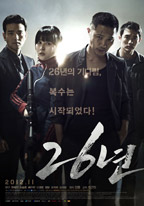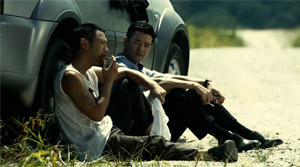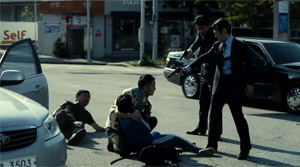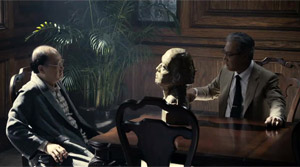

26 nyeon
South Korea 2012
Genre:
Drama, Crime
Director:
Jo Geun-hyeon
Cast:
Jin Goo
Han Hye-jin
Im Seulong
Lee Kyeong-yeong
Bae Soo-bin
Jang Gwang
Lee Mi-do
Jo Deok-jae
Kim Ee-seong

26 Years
Story: 1980 May 18th, president Chun Doo-hwan (Jang Gwang) orders to shoot at a group of protesting civilians in Gwangju. Even now the Gwangju
massacre still affects the life of Jin-bae (Jin Goo), who has pursued a career as a gangster after his father had died in the massacre and his mother had gone
insane. Competitive markswoman Mi-jin (Han Hye-jin) has lost her mother in Gwangju, too, and police officer Jung-hyuk (Im Seulong) his sister. The three are
approached by Kim Gap-se (Lee Kyeong-yeong) and his son Joo-an (Bae Soo-bin) who also haven't got rid of their demons from the massacre 26 years ago. Former
president Chun may have been sentenced to death since that day, but he has been pardoned and now leads an elitist life, protected by dozens of bodyguards.
Gab-se finally wants an apology for his actions from Chun and for this he plans to get as close as possible to the former president. However, every one of the
five individuals deals with the pain of the past in a different way. Thus, Mi-jin is already planning to kill Chun and by doing so finally find
redemption.
Review: "26 Years" attends to a big scar in Korean history, the Gwangju massacre. Justice hasn't been served since that day. Therefore, standing
in the center of this drama are individuals who are still traumatized by the events today, because they lost a family member and had to witness acts of cruelty
that no child should be forced to see. The drama oftentimes tries to be a revenge and gangster flick as well, at times showing us some of the planning
of the assassination while at other times leaving us completely in the dark until the plan is put into action. This is where "26 Years" isn't as successful as
it should have been. However, thanks to outstanding dramatic moments the events are engaging at all times. Even though the same can't really be said about
the ending.

There have already been quite a few movies that either used May 18th as a historical backdrop or put it completely into the story's focus like in
"May 18". However, "26 Years" deals with the fact of how the events from back then still have an impact on the lives of individuals.
It is a shameful eyesore in Korean history which Generation X doens't want to pass on to the next. A few individuals coming together who actually
don't necessarily want revenge, but justice and some sort of salvation, is a fascinating starting point for an assassination attempt on the former president
Chun Doo-hwan, which some Koreans maybe would really like to see put into action. So even though we find ourselves rooting for the protagonists to succeed
with their mission, the story actually revolves around the question of justice. After all, Chun has in fact already been sentenced to death.

But some are simly asking for an apology, which Chun couldn't bring himself to say until this very day. The former president surely isn't painted in a good
light and there instantly is a feeling of animosity towards him, but that's already inevitably the case when just taking into account the historical facts
and not the coldbloodedness depicted on the screen, too, which proves that Chun has never had any problems of having blood on his hands when it meant getting
what he wants. You don't need to have any background knowledge of historical events. The Gwangju massacre is shifted to a personal level through the protagonists
by showing their experience on that day via an animated sequence, probably also to tone down the violence, which is a fantastic sylistic device since we are
only becoming more aware of that, making those scenes hard to digest, as if real blood and guts were shown. Especially since the movie doesn't refrain from
showing blood later on either.
Jin-bae, charismatically portrayed by Jin Goo ("Moby Dick", "Epitaph"), carries a scar on his face
that has been inflicted on him by his mother when she believed to see one of the Gwangju soldiers in front of her. This scar naturally is also a metaphor and
it is the reason for him to end up a gangster. Although it needs to be pointed out that the gangsters are actually all quite likeable, having been forced
to become gangsters, because the real gangsters are holding the reins on the political stage. Acting-wise Lee Kyeong-yeong ("Whistle
Blower", "National Security") once again stands out the most. Directing-wise Jo Geun-hyeon delivers neat work with his
debut, which then again shouldn't surprise, after all he was the art director for movies like "My Way" and
"A Tale of Two Sisters". The score is well implemented, too.

The story itself is engaging and is based on a webtoon by Kang Pool, who also provided the source material for movies like "The Neighbors" and "Hello Schoolgirl". However, the cinematic adaption needs to be criticized for the fact that the pacing drops too often. And when the director very obviously tries to shift up a gear it barely works out. This also becomes apparent during the showdown. Although we are quite aware that Chun Doo-hwan is still alive in reality the movie characters get pretty close to him and it seems possible that "26 Years" might walk down a road of alternative reality. The very close murder attempts get so repetitive, though, that they ultimately lack any energy. The drama also seems too stretched at the end, which is particularly sad since otherwise the drama revolving around the individuals stands as the movie's forte. By the way: The credit screen takes up fifteen minutes of the film's running time since everyone who helped financing the movie via crowdfunding gets a thank you. Film producers had concerns about the politically charged subject of the movie or they agreed to produce the film only to suddenly jump ship. Therefore, "26 Years" is also a movie about freedom of speech which goes back to the people more than the Korean government might be happy to see thanks to the power of the internet...

Disclaimer

















